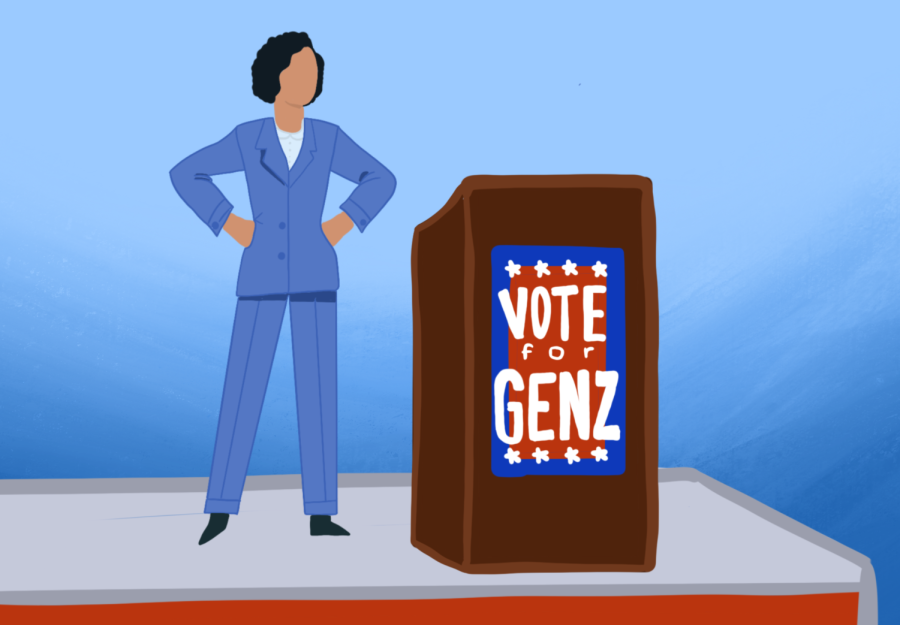It’s Time To Retire — Make Room for the Next Generation
Although in recent years more Generation Z and Millennial individuals have been voting, there is still a lack of age range in our elected positions.
February 1, 2023
Many Americans fantasize about the day that they can retire from their jobs. It is a chance to step back from the pressures and stress that burden the workforce and begin a new chapter in one’s adult life. This transition typically takes place anywhere from ages 60 to 65.
For a lot of people, this final goodbye to the corporate world is a joyous occasion. It allows them to make room for the new generation of workers and spend the rest of their years surrounded by loved ones.
But, for our elected government officials, this couldn’t be further from the truth.
The median age for someone in the 117th Congress — which just ended on Jan. 3 — was approximately 64 years old, and, surprisingly, many people in this congressional session were much older than that.
Although ageism — the discrimination of elderly people solely based on their age — is a real thing that many seniors face, among our current officials, it is valid to want a younger, more diverse array of people representing our country and passing laws on our behalf.
The issue is not with their age, but rather about widening the representation within our government.
I have no doubt that many people of the older generations in Congress and other elected positions are well-educated and knowledgeable about politics. But, I also believe that it is beneficial to have Generation Z and Millennial individuals in office so that they can speak on behalf of young people in America, helping to make decisions that will ultimately affect them much more than the Silent Generation or Baby Boomers — individuals of ages 58 to 95 — who currently are the most represented groups in Congress.
Issues like climate change and systemic racism are matters that we, as young people, have learned about in school and grown up understanding the magnitude of. Throughout the past 50, and even 10 years, schools have shifted to a more open and in-depth curriculum covering issues such as systemic racism, LGBTQ+ issues, climate change, and a myriad of other social issues that have become increasingly more prominent topics in daily life.
My generation has participated in Youth Climate Strikes and Black Lives Matter protests, so there is not a lack of care or understanding — rather, an inability to get involved with or elected into our government.
Generation Z is very politically-charged and yearns for systemic change — something unconducive to the current state of disarray and partisan conflict happening in Congress.
Recently, the city of West Linn, which has a population of around 27,000, appointed a 23-year-old as their mayor, making him the city’s youngest mayor ever. This is a major stride in getting young people involved in politics, but this job doesn’t suffice from a financial standpoint. In a world that is rapidly getting more expensive to exist in, $6,400 per year as a salary does not cut it.
Young people need to see politics as a viable option for a career in order to pursue it as a full-time job. There need to be more opportunities for young adults to get involved in local and national government and earn adequate pay to support themselves in doing so. Being a mayor should not be your side hustle.
One example of why a change is needed is that, according to Pew Research Center, “Among Republicans and those who lean to the Republican Party, there are striking differences between Generation Z and older generations on social and political issues.”
So, even though they belong to the same party, Generation Z politicians have strikingly different views than their predecessors, meaning that the goals of the younger generations are often underrepresented in government spheres.
There is also a level of accountability for this that voters face. The younger generation of voters has had extremely low voter turnout throughout the past few decades. Although there was a glimmer of hope that came from the recent 2022 midterm elections, there is still progress that needs to be made.
Older people in general do tend to vote at higher rates when compared to Generation Z, meaning that they’re more likely to vote for seniors because they themselves are around the same age.
One thing that makes voters more prone to voting for older politicians is name recognition. If you’re used to seeing Dianne Feinstein on your ballot for the past 30 years, it might be a habit for you to check her name off if you can’t put in the time to research every individual on the ballot.
Although it might be hard for older adults to put their trust in young people, it is necessary for leaders to represent the younger generations and fight for the things that young adults care about.
If Generation Z has to carry the burden of saving the world, at least open up the legislative floor to us.
Government leaders: It is time to pass the baton.






